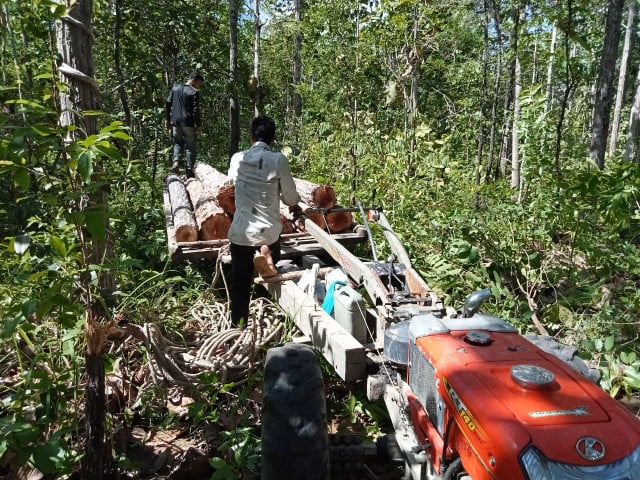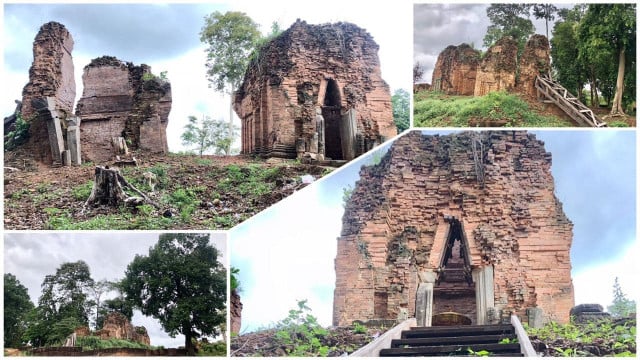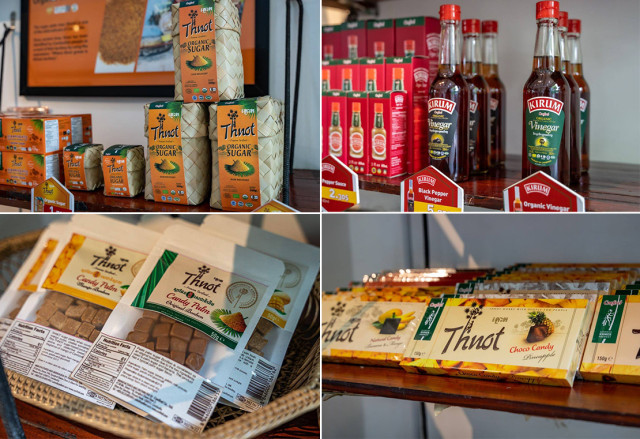Sambo Manara, a Pillar of Light for Cambodia

- By Han Noy
- and Tes Nuphea
- April 23, 2024 11:00 AM
On the morning of April 20, the sad news emerged about the death of prominent history professor Sambo Manara, at the age of 67 in Phnom Penh.
Having a selfless sacrifice scholar after the atrocities of the Pol Pot regime was an exceptional blessing for Cambodia and students. All his life Prof. Sambo Manara stood unswervingly for the truth in Khmer history and lectured students to learn from the past, reflect on the present and shape a brighter future for Khmer.
The ideal idea that education through patriotism and beyond heroic selflessness to the country and students was deeply rooted in his heart and soul.
The Core of Sambo Manara
Sombo Manara's legacy is deeply woven into the fabric of Cambodia's history, his passing leaving a profound void in the hearts of many. Renowned as a prominent history and Khmer studies professor for almost 46 years, he was more than an educator; he was a guiding light for his students and a pillar of strength for his nation.
Born into a time of turmoil and suffering, Sombo Manara experienced first hand the atrocities of the Pol Pot regime. Yet, instead of being consumed by bitterness or despair, he emerged as a beacon of resilience and hope.
His life's mission was clear: to illuminate the truth of Cambodia's past and to inspire future generations to shape a brighter future.
Throughout his career, Sombo Manara's commitment to truth was unwavering. He dedicated himself wholeheartedly to unravelling the complexities of Khmer history, challenging his students to delve deep into the lessons of the past. His lectures were not mere recitations of facts; they were impassioned pleas for understanding, empathy, and reconciliation.
But it wasn't just his scholarly pursuits that defined Sombo Manara. It was his unwavering devotion to his students and his country.
He believed fervently in the power of education to transform lives and societies, instilling in his students a sense of duty and patriotism. He demanded excellence, pushing his students to strive for greatness and never settle for mediocrity.
Yet, behind his strict demeanor lay a heart of gold that beat with love and compassion for his students and his nation. He was a mentor, a confidant, and a friend to many, always ready to offer guidance and support in times of need.
In every aspect, Prof. Sambo Manara was filled with noble duty and heavy responsibility as having the DNA of a teacher inherited from his father.
Whether on weekdays, weekends or holidays, he was committed to upholding education and community work and delivering results. He bridged the gap of high-standard education between rich and poor communities and was a major driver of socio-cultural development in Cambodia.
As a history professor, Sombo Manara's passion for his subject was infectious. He didn't merely impart facts and figures; he breathed life into the past, urging his students to learn from it, to confront the darkest chapters of Cambodia's history, and to strive for a brighter future.
What truly set Sombo Manara apart was his selflessness. He didn't view teaching as just a profession but as a solemn duty to his country, his students, and to the truth. His lectures were not just academic exercises; they were impassioned pleas for remembrance, for understanding and reconciliation.
But perhaps what made Sombo Manara truly exceptional was his belief in the power of education to shape minds and transform societies.
He understood that true patriotism wasn't just about waving flags or singing anthems, It was about instilling in the younger generation a sense of responsibility, a commitment to justice, and a determination to build a nation worthy of its past.
Besides this, there is no doubt that his ability and wisdom are unmatched, witnessed by his appointment as an advisor to two prime ministers: the longest-serving Prime Minister of Cambodia, Hun Sen, and a Western-educated PhD holder, Prime Minister Hun Manet.
What is his philosophy and ideology?
When coming to the deep details of Prof. Sambo Maran’s thought, the idea of Khmer developed by his discerning version is proud of “being KHMER”: knowing about the strengths and weaknesses of predecessors, embracing hope, honour, and honesty over negativity, humiliation, and insincerity, adhering to morale with the quality education, building the strong economics and survivability, remembering the gratitude then compassionately paying the price, reminding what spurs our failures and what drives our successes, reflecting what more to be done and ways to avoid the repetition of the past historical mistakes.
Central to Prof. Sambo Manara’s ideology is the imperative for individual and collective responsibility in nation-building. His aphorism, "កុំមើលបំណាំ កុំដាំបំណុល" or “Do not see the problem, do not growl at the burden”, encapsulates the call for citizens to eschew complacency and actively contribute to societal solutions. Moreover, he advocates for unity across diverse backgrounds, invoking a proverb “កុំរស់នៅក្នុងអម្រែកសង្គម ត្រូវរស់ជួយសង្គម” or in English, “Ones must not live to be a social burden; they must live to help the society,” emphasising collective endeavour towards Cambodia's advancement.
In all generations, human resource development is the backbone of the nation. Prof. Sambo Manara prioritized youths in shaping their soft skills in terms of rightfulness, ownership, and independence. He had a sharp tongue in building the characters of his academic proteges to endure the problems and sufferings en route to accomplishments, per his quote “Don't bow to the problems and cry to be pitiful, must get up with pride and move on (កុំយំឱ្យគេអាណិត ត្រូវតាំងចិត្តធ្វើឱ្យគេកោត)”.
He showed them good examples to become productive successors with the Khmer proverb “the old will be gone while the young will inherit the obligations (ទំពាំងស្នងឬស្សី)”.
Furthermore, he puts his hope on the young people for Cambodia’s development until the end of his life. Sambo Manara advised: “One can see the future of the country, strong or weak, and can look at the activities of young people today”. No doubt that’s why he spent his whole life teaching, guiding, inspiring, and working with youth.
His approach towards education was firmly based on stories and reflections of evidence-based and fact-checking history as well as Buddhist theory in complement to the reality nowadays. Meanwhile, having a life with dignity and courage, helpfulness, philanthropy, enoughness and nationalism were the primary objectives of his classes.
Accordingly, his unique behaviour to numerous legacies, insightful visions to bold actions, his generous devotion to the betterment of Cambodia and its people should be described as “Sambo-Manaraism”.
Lessons for politicians and policymakers
The legacy of Prof. Sambo Manara offers profound lessons and inputs regardless of his life experiences and academic performance for Cambodian politicians and policymakers. Building a nation is primarily dependent on a moral basis.
Firstly, his unwavering commitment to peace and progress underscored the imperative of prioritizing national interests over personal gain. As a devoted professor, he always defended Khmer values and nationalism towards his inheritors with pride at home and abroad and contributed all pictures of charity to society improvement. Concerning this, if you grow up in a generation of peace and development, don't let your country fall into war again and work harder to minimise the citizens' pains and enhance the Khmer idealism.
Secondly, his selfless dedication to education and community service serves as a testament to the importance of servant leadership and public service ethos.
Even though he was fighting his illness while his body could be moved, his mind couldn't stop thinking about how to empower and transform his resources and philosophy to approach the nation.
Passing away at the age of 67 with today’s cutting-edge medical treatment is hard to take in.
It’s just one simple thing: working more than relaxing and thinking about the national interests and the future of his younger generations rather than thinking about his personal life.
In consideration of this, Cambodian political leaders and policymakers must be committed to putting the national agenda and excellence first beyond self-interests. They must work for the people, not a small group of interest.
Thirdly, his advocacy for freedom of expression highlights the value of candid and constructive discourse in democratic governance. Manara plays a significant role in demonstrating multiple ideas to reflect all sides and views differently. Importantly, as he is the professor symbolising intellectualism has a role to play in contributing to the development of the country, he most of the time sacrificed his time, energy, or even freedom and life to offer interviews to all kinds of media outlets in fostering the positive development of Cambodian society.
It is how he fulfiled his role as the scholar who instiled awareness among the public and how he was the role model in speaking the truth which is fundamentally essential to democracy.
Fourthly, his penchant for creative problem-solving underscores the importance of innovation and adaptability in policy formulation. Every challenge he faced in his endeavours, he always came up with creative solutions. In every lecture, he typically showed up with innovations for his audience.
He not only raised the problems in our society but also paved the way for workable solutions. About this, when the government designs a policy, research and innovation shall be the principles guided for the sustainable public interests and people’s prosperity and happiness.
In conclusion, Sombo Manara's passing is an overwhelming source of grief for Cambodia, but his legacy will endure for generations to come. He leaves a legacy of courage, integrity, and selflessness that will continue to inspire and guide those who follow in his footsteps for the future dynamism of Cambodia.
A hero in the modern history of Cambodia.
A game-changer in the realm of Cambodian intellectualism.
Han Noy is Sombo Manara’s former student and currently a freelance journalist based in Phnom Penh.
Tes Nuphea was a student in Prof. Sambo Manara's history class and is a research associate at the Cambodian Center for Regional Studies.















